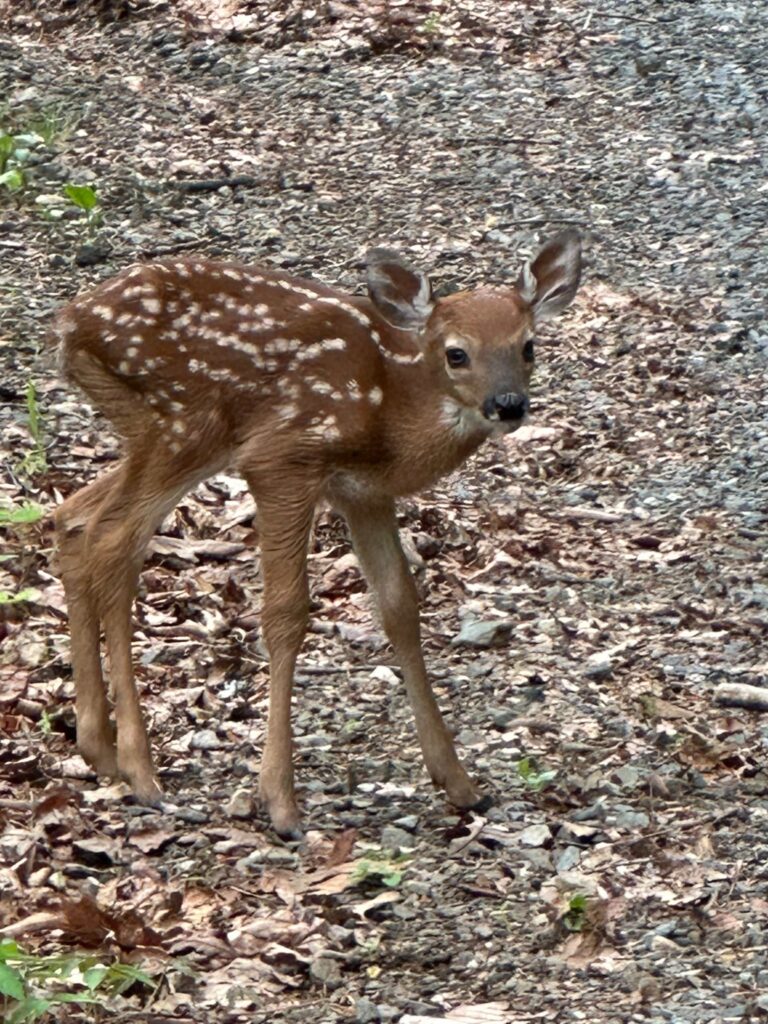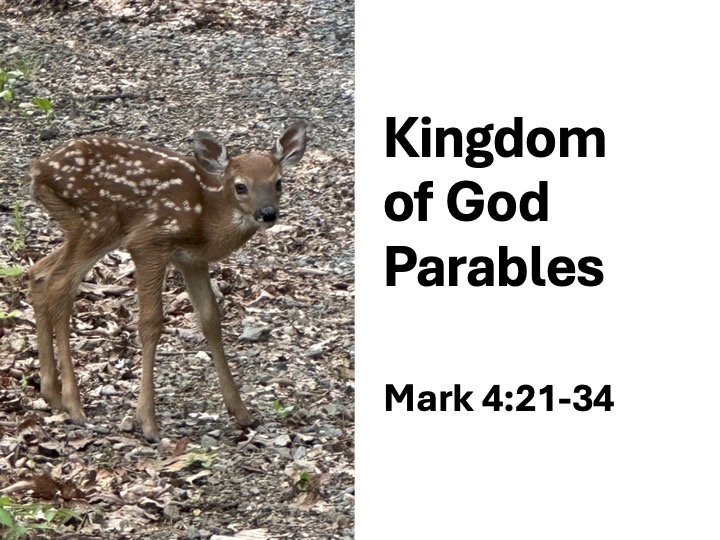Jeff Garrison
Mayberry and Bluemont Churches
May 19, 2024
Mark 4:21-34
At the opening of worship:
Read Acts 2:1-4
Today is Pentecost, in which we recall the empowering of the church with God’s Spirit. As we just heard, God’s Spirit swept among the early disciples like flames, setting them on fire with the gospel. But because I’m focusing on Mark’s gospel this year, we’ll discuss the kingdom of God today. I think this theme works with Pentecost, for the kingdom can only come through God’s Spirit.
We tend to think of the kingdom as something accomplished for us and given as a gift. I like to think of the kingdom as described in Psalm 23, a grassy place beside still waters. This idyllic vision has me semi-horizonal, propped up against a tree, chewing on broom straw while watching puffy clouds float overhead. When I get tired of that, I pull my hat down over my eyes and take a nap, enjoying the peace.
But I’m not sure such ideas fits with much of scripture. One of the tenets of the Presbyterian Church is that we’re to exhibit the Kingdom of God to the world.[1] We may not always be good at that, but it’s our calling. And Pentecost, with those winds of fire rushing about, rouses us up from our naps, reminding us of the work to be done. But we’re also reminded of that invisible hand helping us.
Our scripture this morning contains a series of Jesus’ parables involving the kingdom. And two of the three parables relate the kingdom to farming. So back to that image of me napping up against a tree by the sill waters…. Jesus comes along, shakes me awake, hands me a gardening hoe, and tells me there are rows of crops to be chopped. The kingdom begins now, we’re a part of it. So, ask yourself, what’s God calling you to do?
Before reading the Scripture:
We’re continuing through Mark’s gospel. As we have seen throughout this series, Mark focuses more on narrative than teaching. We learn what Jesus did, including teaching, but often Mark doesn’t give us the content of such teachings. If you remember from my sermon three weeks ago, when I was last in the pulpit, there are two sections of Mark, each less than a chapter in length, where Mark inserts a string of teachings.[2] In the fourth chapter, Mark pieces together a group of parables which Jesus used to convey the meaning behind the Kingdom of God. Mark starts with the Parable of the Sower (or the Parable of the Soil or the Seeds) which we explored last time.
Next, Mark recalls several short parables Jesus tells. We’ll explore these today. Most of these parables can be found in Matthew and Luke, but in different places in Jesus’ ministry, which indicates how Mark gathered them up and included them in this longer teaching section to give us an idea of Jesus’ teachings.
Read Mark 4:21-34
These parables refer to the unexpected and surprising way God works in our world. The Kingdom of God is not equivalent to the heaven we often imagine, where we stroll around on golden streets. The kingdom is dynamic. It’s a light to be displayed. It grows. The Almighty is a God of creation, and God’s work didn’t stop at the end of Day 6. God continues to create. God builds a kingdom, and, in a way, we get to participate.
Verses 21-25
The first set of stories have to do with our role as Christ followers. If we have seen the light of Christ, we’re to help it shine for others to see. We get this same advice in the Sermon on the Mount, where we’re told to let our light shine so others may see our good works and give glory to our Father in Heaven.[3]
The purpose of light is to illuminate. But there is a veiled warning in the way Mark uses this story. The light will shine one way or another. And it will be illuminating all including our dirty laundry. We need to take the risk and come to the light and be made pure.
The second part of this first set of stories almost sounds counter to the gospel. After all, Jesus speaks of the last being first,[4] but here the one who has more will receive even more. What’s this about? Does it fit with God’s economy that seems to reward the underdog?
Here, Jesus must be alluding to faith, not possessions. Faith is given but must also be used.[5] An athlete can have a natural gift. But only by practice and through working out, can an athlete grow stronger, more proficient, and achieve success. Likewise, faith grows stronger with use. By repeatedly depending on faith, the amount we possess grows or strengthens. Faith, like our bodies, can’t be stagnant. If we don’t use it, we slide backwards.
Verses 26-29
The second group of stories within our passage is about a farmer who plants seeds and then watches his field day and night. He knows he’s not in control of what happens. The seed germinates underground, out of sight. The farmer looks expectantly for the first sprouts.
I don’t know about you, but I get excited when I start to see green sprouts poke through the ground. And it’s amazing how quickly such sprouts take root and grow. In just a few weeks, a squash seed will grow from a couple of leaves about the size of a dime to long vines with huge leaves. As the farmer, we do what we can. We weed, water, and fertilize. But we’re still not in control. This is a perfect metaphor for the kingdom, which grows mysteriously. Yes, we can help it grow, but ultimately the growth is given by God.
This second set of stories contain elements of human freedom and responsibility. It’s freeing to know that God is in control because sometimes our best efforts don’t produce desired results. Farmers certainly know they can faithfully nurse a crop along only to have it wiped out by a hailstorm just before harvest. But what’s important here is not the harvest but the faithfulness. It’s important that we plant kingdom seeds, and then trust God.
When we first moved to Utah, the house we lived in had a wonderful mini orchard in the backyard. There was an apple tree which, because of grafting, produced several types of applies. We also had a pear tree. There was an apricot tree which produced a wonderful harvest one year. The rest of the years we lived there it bloomed earlier and the buds froze. And then there was a mulberry tree which just made a mess. Except for the mulberry tree, I really appreciated the effort someone put into creating that mini orchard. We lived in that house for about four years. If I had planted such trees on day one, I would have never enjoyed a harvest.
After leaving that first house, we moved into a house with a totally barren backyard. We were there for six years. I planted fruit trees, laid out terraces for herbs and vegetables. While I did enjoy vegetables and herbs, it wasn’t until the last summer I was there I received any fruit. 3 peaches! Hopefully, the next owner of that house enjoyed more of a harvest. It’s like that sometimes. As Paul reminds us, someone plants, someone waters, and God gives the growth.[6]
Verses 30-34
It’s interesting that Jesus tells so many parables about seeds. He began the chapter discussing grain. Jesus then uses another parable about grain and the farmer watching its growth. Finally, he ends the parable with a discussion of a mustard bush.
It seems to be a bit paradoxical for mustard to be discussed. As a plant, it could be a nuisance to grain farmers. It shades the grain and takes up valuable space. It also becomes a haven for birds who feast upon the grain seed. So, what is this parable about?
This parable contains layers of meanings. Like the previous parable, we learn how the insignificant can become magnificent. The smallest of seeds becoming a great bush. Like a good storyteller, Jesus uses hyperbole here to bring home a point. The small seed stands in contrast to its growth. As one commentator writes, “The kingdom of God arises from obscurity and insignificance.” We’ll be amazed as God’s kingdom becomes real and more visible and wonder from where it came.[7]
There is also a deeper meaning in this parable about the birds nesting in the branches. This harkens back to the Old Testament prophets who spoke of birds resting in the branches of a tree as a metaphor of the gathering of all of God’s creation. In other words, Jesus alludes to the inclusion of the Gentiles. God’s grace applies to all people.[8] And that’s good (yet humbling) news to those of us who are not descendants of Abraham, but nonetheless follow Jesus.
Conclusion
In these stories, Jesus reminds us of our calling to do what we can to build God’s kingdom. But we’re also reminded that the growth of the kingdom is beyond our control. At times we may not understand and feel discouraged, but we should trust that God has things under control. We do our part, and we trust God for the rest.
In a way, individually, we’re like a foot soldier in a mighty army. We may not understand how our role helps achieve the victory, but we trust and follow orders. And our orders are to love God and to love our neighbors[9] as we trust God to make all things new. Amen.
[1] Presbyterian Church USA, Book of Order,
[2]The other chapter with teaching is Mark 13. See https://fromarockyhillside.com/2024/04/28/the-parable-of-the-sower/
[3] Matthew 5:15-16.
[4] Matthew 19:30, 20:16; Mark 9:35, 10:31; Luke 13:30. See also 2 Corinthians 6:10, 8:9; James 2:5.
[5] Bebe, in his Homilies on the Gospels (7th Century) says that those who hear Jesus’ words and observe them in their hearts will receive more. See also Morna D. Hooke, The Gospel According to Saint Mark (1991, Hendrickson Publishing, 1997), 134-135.
[6] My paraphrase of 1 Corinthians 3:6.
[7] James R. Edwards, The Gospel According to Mark (Grand Rapids, MI: Eerdmans, 2002), 144-145.
[8] Psalm 104:12; Ezekiel 17:23, 31:6; Daniel 4:9-21. See Edwards, 145.
[9] Mark. 12:30. See also Matthew 22:37 and Luke 10:27.



That baby deer is precious ~ beautiful shot, Jeff! I enjoyed your sermon ~ lots of takeaways!
I grew up in a house that had fruit tree’s in the front and back yard. Even my grandmas house had a plum tree. I looked my old house up on Google and all of the tree’s are gone now. Made me kinda sad.
I have planted a many fruit trees here, but it’s a battle to keep the deer from eating them.
I’m glad to see you in your red for Pentecost! We read from Acts and John today. May the Spirit within me guide me to spread the love of Christ within His Kingdom.
I don’t often get to wear red… Pentecost and the Christmas Season